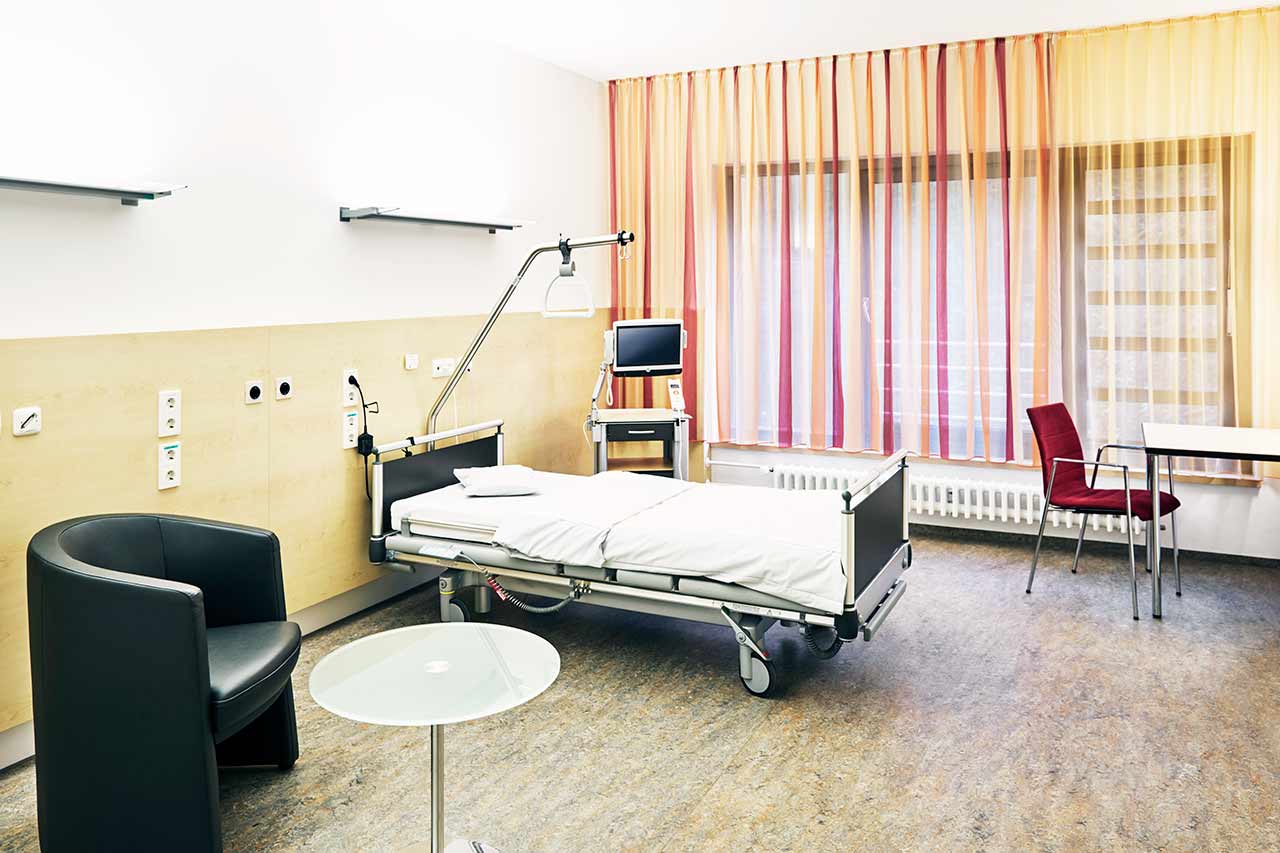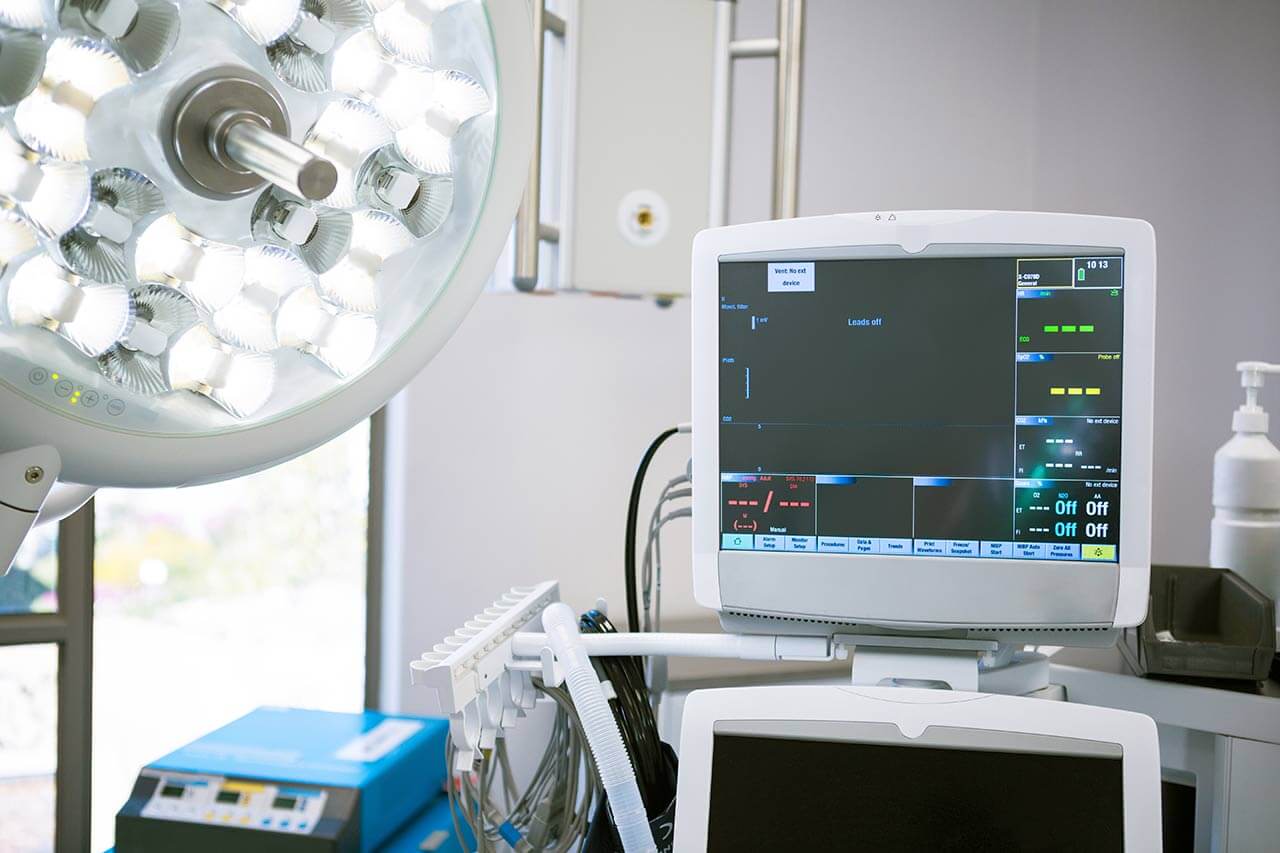
About the Department of Neurology at Hospital Oberberg Gummersbach
The Department of Neurology at the Hospital Oberberg Gummersbach provides comprehensive medical care for patients with brain and spinal cord diseases, peripheral nervous system pathologies, and neuromuscular diseases. The primary interest of the department's medical team is the treatment of stroke, Parkinson's disease, multiple sclerosis, myasthenia gravis, epilepsy, herniated discs, polyneuropathies, dystonia, and dementia. Structurally, the department consists of two general units with 66 beds, a stroke unit with 10 beds, and an intensive care unit with 4 beds. The patients are in the safe hands of a highly qualified medical team consisting of 6 doctors, 12 assistant physicians, and specially trained nurses. Patients can undergo their diagnostics and treatment on both an inpatient and outpatient basis. More than 2,000 inpatients undergo their treatment at the medical facility every year. The department has an excellent technical base: equipment for extracranial and transcranial Doppler sonography, duplex sonography, electroencephalography, electromyography, electroneurography, recording of evoked potentials, etc. In the course of the treatment, the doctors use drug therapy with the latest generation of medicines, botulinum toxin therapy, physiotherapeutic treatment, and other effective methods. Each patient is offered an individual treatment regimen, developed taking into account the characteristics of his or her specific clinical case. The Head Physician of the department is Prof. Dr. med. Franz Blaes.
An integral part of the department's daily clinical practice is the treatment of stroke, an acute cerebrovascular accident that causes the death of parts of the brain and impairment of the functions of the nervous system. Patients suspected of having suffered a stroke are admitted to a specialized stroke unit. There is a highly qualified medical team here that provides emergency medical care. The department's stroke unit has 10 beds and is equipped with the latest technology, which allows the department's neurologists to provide highly effective treatment even in the most complex cases. More than 1,500 patients are treated in the stroke unit every year, so it has a great deal of experience in this area. The first-priority diagnostic examinations for suspected stroke are blood tests, an ECG, and a CT scan. In most cases, lysis therapy with thrombolytics is performed to restore the patency of the blood vessels in the brain. This treatment is only possible within the first four hours after the onset of symptoms. After the initial therapeutic measures, the patient requires bed rest with constant monitoring of heart rate, blood pressure, respiration, glucose levels, body temperature, brain and kidney function, and metabolic parameters. Once the patient's condition stabilizes, the early phase of rehabilitation begins immediately, still in the stroke unit. Physiotherapists, occupational therapists, and speech therapists work with the patient. Their task is to restore lost brain functions and prevent worsening neurological deficits. After discharge from the hospital, rehabilitation continues on an outpatient basis. The patient is also prescribed anticoagulants and other medications to prevent a recurrent stroke.
The department also offers the services of a specialized Сenter for Myasthenia Gravis, certified by the German Myasthenia Gravis Association. This neurological disease is chronic and is accompanied by damage to the peripheral neuromuscular system. Myasthenia gravis causes a disruption in the transmission of nerve impulses to the muscles, as a result of which the muscular system is unable to perform its functions. The department's specialists have excellent qualifications in the treatment of all forms of myasthenia gravis: ocular, bulbar, and generalized. Each of these types of myasthenia gravis is characterized by damage to specific muscle groups. In most cases, the symptoms of myasthenia gravis develop spontaneously. The disease progresses rapidly, and the patient's quality of life deteriorates. In some situations, a myasthenic crisis may occur. This is a life-threatening condition that requires emergency medical attention. If myasthenia gravis is suspected, the department's doctors conduct a full diagnosis, including a neurological examination with a study of the patient's family history, laboratory tests, and instrumental examinations. Pharmacologic testing with anticholinesterase drugs may also be required. The treatment of myasthenia gravis is based on drug therapy with various groups of medicines. In some cases, the neurologists in the department also use plasmapheresis. This blood purification procedure removes antibodies that block the transmission of signals from nerve endings to muscle fibers. Patients with myasthenia gravis have a high risk of developing a thymus gland tumor. In such cases, surgery is needed to remove the tumor.
The department also provides competent medical care for patients with epilepsy. Patients with this neurological disorder experience periodic epileptic seizures due to abnormal electrical activity in the brain. Epilepsy is a complex pathology that requires comprehensive and long-term treatment. During the diagnostic stage, doctors perform various tests, including a neurological examination, blood tests, electroencephalography, long-term video EEG monitoring, and CT scans and/or MRI scans of the brain. In some cases, genetic testing may also be done. The first-line treatment for epilepsy is the use of antiepileptic drugs. The specific drug or combination of drugs, as well as the dosage and duration of treatment, are determined individually by the attending physician. The second-line treatment is vagus nerve stimulation or deep brain stimulation. When clinically indicated, doctors perform surgery to remove an epileptogenic focus in the brain, surgical resection of the temporal lobe of the brain, removal of the frontal lobe of the brain, and other surgical procedures.
The department's therapeutic offer is complemented by the treatment of multiple sclerosis, a common chronic progressive inflammatory and degenerative disease of the central nervous system. The neurological disorder occurs due to a malfunction of the immune system, which begins to attack the myelin sheaths of neurons in the brain and spinal cord. The myelin sheath helps the neuron quickly and correctly transmit impulses. Otherwise, the body functions that are regulated by the nervous system are disrupted: vision, speech, muscle tone, thinking abilities, urination, and defecation. Magnetic resonance imaging and cerebrospinal fluid (CSF) analysis are done to make a diagnosis. Unfortunately, multiple sclerosis remains an incurable disease, but the department's neurologists have at their disposal modern methods to achieve long-term remission of the pathology and provide the patient with a decent quality of life. Drug treatment plays a key role in the therapeutic process. The department also successfully performs plasmapheresis (a blood purification procedure). The therapeutic effect is achieved by removing pro-inflammatory cytokines and antibodies against the myelin sheath of nerve fibers from the blood.
The department's key clinical areas include the following:
- Diagnostics and treatment of stroke
- Diagnostics and treatment of myasthenia gravis
- Diagnostics and treatment of epilepsy
- Diagnostics and treatment of multiple sclerosis
- Diagnostics and treatment of Parkinson's disease and other extrapyramidal movement disorders (for example, blepharospasm or torsion dystonia-parkinsonism)
- Diagnostics and treatment of meningitis
- Diagnostics and treatment of brain and spinal cord tumors
- Diagnostics and treatment of polyneuropathies and other diseases of the peripheral nervous system
- Diagnostics and treatment of acute and chronic headaches
- Diagnostics and treatment of other chronic pain (for example, back pain or neuralgia)
- Diagnostics and treatment of herniated discs
- Diagnostics and treatment of dementia
- Diagnostics and treatment of dystonia
- Diagnostics and treatment of other neurological disorders
The department's range of diagnostic and therapeutic services includes the following:
- Diagnostic services
- Extracranial and transcranial Doppler sonography and duplex sonography
- Ultrasound of the peripheral nerves of the upper and lower extremities
- Electroencephalography
- Electromyography
- Electroneurography
- Registration of evoked potentials
- Cerebrospinal fluid (CSF) analysis
- Computed tomography and magnetic resonance imaging (in collaboration with the Department of Radiology)
- Therapeutic services
- Drug therapy: tablets, injections, and infusions
- Botulinum toxin therapy
- Lysis therapy
- Plasmapheresis
- Physiotherapy, occupational therapy, and speech therapy as part of the early phase of rehabilitation after a stroke
- Other medical services
Curriculum vitae
Since 2010, Prof. Dr. med. Franz Blaes has been the Head Physician of the Department of Neurology at the Hospital Oberberg Gummersbach. The professor studied human medicine at the University of Mainz and the University of Saarland (1988-1994). While working as an Assistant Physician at the University Hospital Saarland Homburg, he defended his doctoral thesis on oncological diseases of the nervous system. After his scientific internship at the University of Oxford (1998-1999), Prof. Blaes began to work in the Department of Neurology at the University Hospital Giessen, where he held the position of Senior Physician (2002-2010). For many years, he has headed the Neurological Intensive Care Unit and then became the Head of the Department of Neurophysiology. In addition to the treatment of acute types of stroke, he specializes in the diagnostics of diseases of the peripheral nervous system as well as in the treatment of inflammatory diseases of the nervous system, such as multiple sclerosis, myasthenia gravis, and inflammatory neuropathies. In addition, Prof. Blaes worked as the Head of the Center for Muscle Disorders Marburg-Giessen-Kassel.
In 2006, Prof. Blaes had his habilitation (research on inflammatory neuropathies). In 2009, he became the Extraordinary Professor at the Justus Liebig University Giessen. His research interests are the diagnostics and treatment of inflammatory diseases of the peripheral nervous system and Sudeck's atrophy. He is the author of more than 60 articles in international journals on these subjects. Prof. Blaes also made a great contribution to the creation of the Center for Natural Sciences in Giessen.
Photo of the doctor: (c) Klinikum Oberberg GmbH





